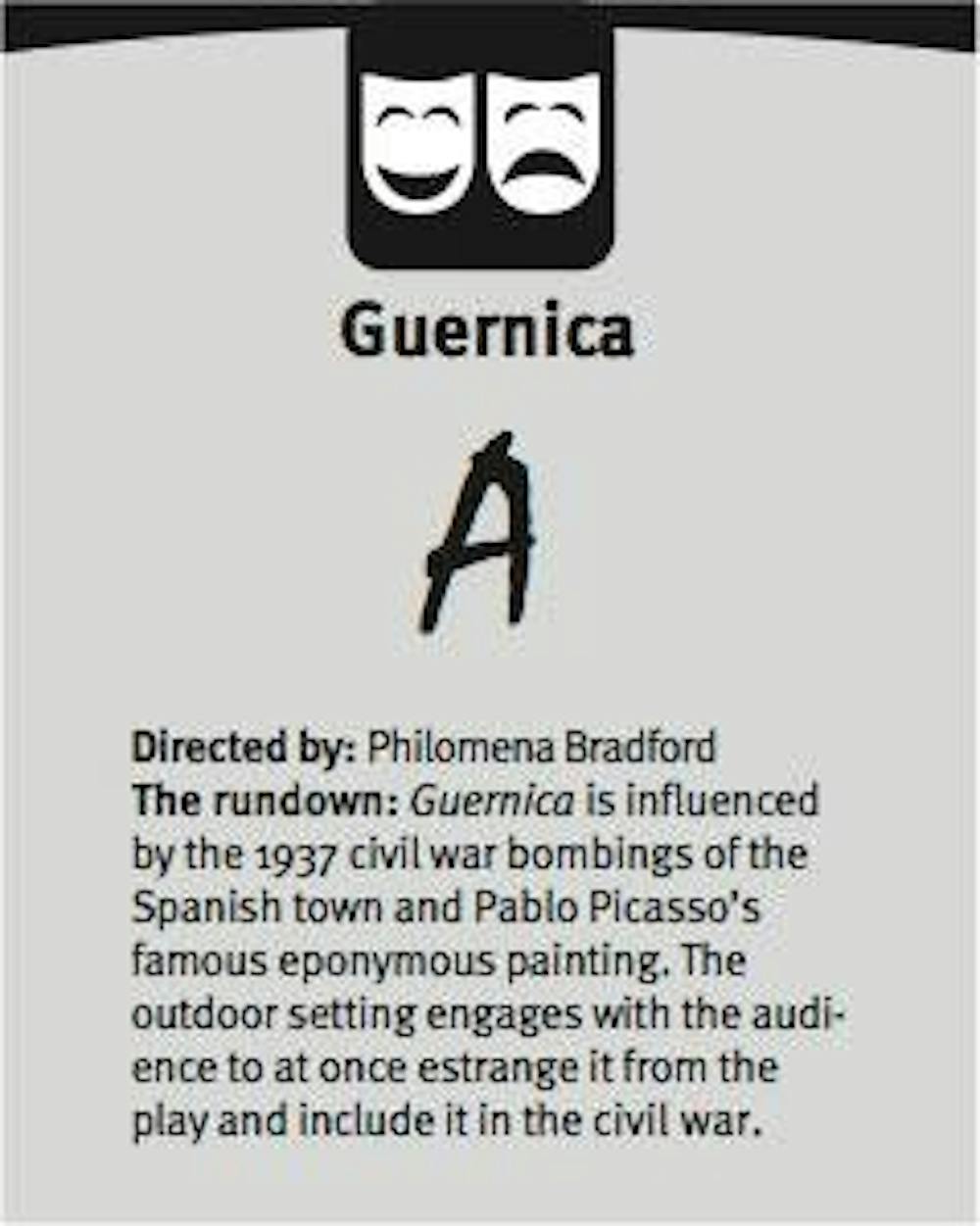Guernica grapples with questions of violence and war

Duncan College's performance of Spanish playwright Fernando Arrabal's Guernica sends its audience somewhere outside of its green college quad, but where, I am not exactly sure. As planes pass over, the sound of bombings echoes through the courtyard and off-stage characters and random passersby watch the play in the center of the quad. I cannot tell whether I am meant to see the play as set in bomb-ridden Guernica, Spain - the fake rubble in the middle of an otherwise safe and clean college; or set in the aftermath of almost any large act of violence. In any case, I appreciated that the short, sharp college production directed by Duncan senior Philomena Bradford could lead me to ask such questions.
Guernica draws from both the 1937 bombing of the Basque city during the Spanish Civil War and Pablo Picasso's mural of the same name. Fanchou (Duncan junior Ben Hirsch) tries to talk to his wife Lira (Hanszen College senior Nicki Pariseau) and help her escape from the rubble of the lavatory in their bombed-out house. Fanchou is constantly interrupted by characters from Picasso's mural, including a sadistic officer (Bradford), a refugee mother (Duncan freshman MiJin Han), her scared child (Duncan freshman Chloe Vuang), a writer and a novelist surveying the historic moment (Duncan freshman Jack Williams and Martel College junior Ellise Brooks) and the sirens and chaos of each new round of bombings.
Overall, each actor gives a solid performance. Pariseau's voice strongly rings out across the quad and creates the image of a whining, whimpering old wife even though she remains hidden behind a shack of rubble throughout the entirety of the play. Hirsch's every shuffling step in ratty bath slippers speaks of an older man even though his face and clear voice seem to hint at the younger demeanor of the actor underneath.
Though he totters through the rubble and stumbles backaward when the officer prowls too close, Fanchou neither shivers at the bombs floating overhead nor seems to care when his wife's cries intensify as she is buried deeper by the falling stones. Is he really the war hero that the writer and journalist catalogue and immortalize? Or has he become one with the violence all around him, bickering with Lira as if they cannot be touched by the next round of bombs?
Though some of the other characters, such as the mother and daughter, merely dash across the stage in fear, their quick entrances contrast Fanchou's nonchalance. The victims of Guernica are not purely brave and courageous; they are not above squabbling over trite day-to-day events in the midst of a civil war.
One of this show's best assets is its use of space. Duncan already has lighting and a pavement area marked out for a stage in the center of its courtyard. With rubble stacked up in piles and built up into a small shack, the quad is easily transformed into a war-torn arena. Better yet, this open space allows the outside world to contribute and comment on the action occurring within the play's written text. When a Southwest Airlines plane flies over just as the next round of bombing noises begins, it seems as if Duncan senior Ryan Artecona had planned it into his sound design. Every so often, the presence of Duncan students watching the show as they wait for the elevator draws me away from the action and reminds me that I, too, am an observer, spying in on these moments.
This open area also means that although the smaller roles are not on stage, their every movement still contributes to the main action. Vuang is still an innocent little girl when she sits offstage, swinging her legs underneath her chair. And the officer, menacing like a creepy clown, scares the audience just as much when she walks behind the seats as when she leers and prods at Fanchou on stage. Every movement both draws the audience out and points it back to the play.
What Bradford and the Duncan college theater creates is not purely Guernica, Spain, or even Picasso's painting, but something created by the perceptions of every cast member
and passerby.
More from The Rice Thresher

Andrew Thomas Huang puts visuals and identity to song
Houston is welcoming the Grammy-nominated figure behind the music videos of Björk and FKA twigs on June 27.

Live it up this summer with these Houston shows
Staying in Houston this summer and wondering how to make the most of your time? Fortunately, you're in luck, there's no shortage of amazing shows and performances happening around the city. From live music to ballet and everything in between, here are some events coming up this month and next!

Review: 'Adults' couldn’t have matured better
Sitcoms are back, and they’re actually funny. FX’s “Adults” is an original comedy following a friend group navigating New York and what it means to be an “actual adult.” From ever-mounting medical bills to chaotic dinner parties, the group attempts to tackle this new stage of life together, only to be met with varying levels of success.

Please note All comments are eligible for publication by The Rice Thresher.